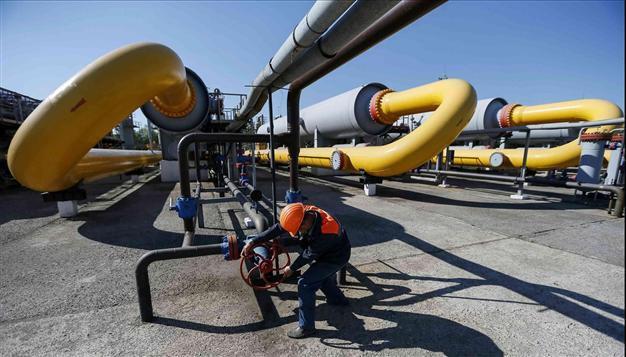Russia's Gazprom reduces gas to Ukraine after deadline passes
MOSCOW - Reuters

A worker turns a valve at an underground gas storage facility near Striy in western Ukraine in this May 21, 2014 file photo. REUTERS Photo
Russian natural gas exporter Gazprom reduced supplies to Ukraine on June 16 after Kiev failed to meet a deadline to pay off its gas debts in a dispute that could disrupt supplies to the rest of Europe.
Announcing that Ukraine will now only get gas it pays for in advance, Moscow put the onus on its neighbour to guarantee the European Union receives supplies that transit through Ukraine.
Kiev and Moscow failed to agree overnight on the price of future gas deliveries, with both sides refusing to abandon well-established positions: Russia offering a discount and Ukraine rejecting it as a tool for political manipulation.
Talks were already difficult but were also clouded by the worst political crisis between Russia and Ukraine since the Soviet Union collapsed, including the shooting down of a Ukrainian military plane by pro-Russian separatists in the east of the country on June 14 and accusations by the West that Russia is arming the rebels.
Russian officials said Alexei Miller, Gazprom's chief executive, and Energy Minister Alexander Novak would meet President Vladimir Putin later on June 16.
"Today, from 10:00 a.m. Moscow time, Gazprom, according to the existing contract, moved Naftogaz to prepayment for gas supplies ... Starting today, the Ukrainian company will only get the Russian gas it has paid for," it said.
Gazprom had demanded Kiev pay off at least $1.95 billion of a gas debt that it puts at more than $4 billion by the June 16 morning deadline, or face supply cuts and the prospect of paying up front.
Gazprom said on June 16 it had filed a lawsuit at the Stockholm arbitration court to try to recover the debt, while Ukraine's Naftogaz said it was filing a suit at the same court to recover $6 billion in what it said were overpayments.
A source at Gazprom said supplies to Ukraine had been reduced as soon as the deadline passed. EU data suggested that volumes were broadly stable as of 06:30 GMT, but it could take hours for data on Russian gas flows via Ukraine to reflect any reduction in supply in Slovakia or elsewhere.
Any reduction of supply could hit EU consumers, which get about a third of their gas needs from Russia, around half of it through pipelines that cross Ukraine. Earlier price disputes led to the 'gas wars' in 2006 and 2009 and Russian accusations that Ukraine stole gas destined for the rest of Europe.
"The gas for European consumers is being delivered at full volume and Naftogaz Ukraine is required to transit it," Gazprom spokesman Sergei Kupriyanov told reporters.
Naftogaz sues Russia
Meanwhile, Ukraine's state energy firm Naftogaz announced June 16 it had also filed a $6.0-billion (4.4-billion-euro) suit against its Russian counterpart Gazprom in a Stockholm arbitration court.
Naftogaz the suit aimed to recover its past "overpayment for gas." The company added that it would ask the court to establish "a fair price" for future Russian deliveries.
The gas talks, brokered by the European Commission, broke down in Kiev in the early hours, with the sides unable to reach agreement on prices and on changes to a 2009 contract that locks Ukraine into paying the highest price in Europe.
Kiev wants to pay $268.5 per 1,000 cubic metres of gas - the price it had been offered when Yanukovich was in power - but, in a compromise last week, said it would agree to pay $326 for an interim period until a lasting deal was reached.
Moscow had sought to keep the price at the 2009 contract level of $485 per 1,000 cubic metres, but had offered to waive an export duty, bringing down prices by about one-fifth to $385, which brings it broadly into line with what Russia charges other European countries.
Kiev says that waiving the duty rather than agreeing a new contract price means Moscow could use the threat of cancelling the waiver to keep Ukraine in its sphere of influence.
European Energy Commissioner Guenther Oettinger said Moscow had declined a compromise proposal during the talks in which Kiev would pay $1 billion immediately and then make monthly debt payments to Gazprom. Ukraine would also pay $385 per 1,000 cubic metres in winter and around $300 in the summer months.
